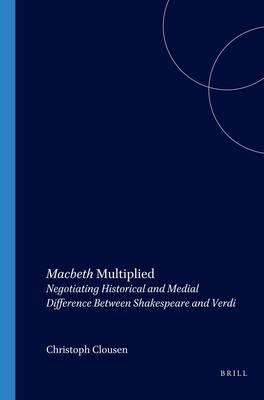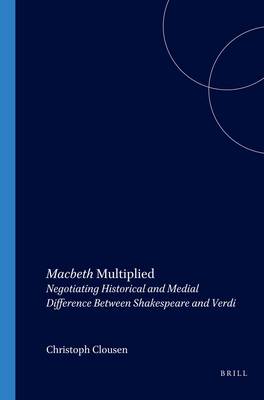
- Afhalen na 1 uur in een winkel met voorraad
- Gratis thuislevering in België vanaf € 30
- Ruim aanbod met 7 miljoen producten
- Afhalen na 1 uur in een winkel met voorraad
- Gratis thuislevering in België vanaf € 30
- Ruim aanbod met 7 miljoen producten
Zoeken
Omschrijving
In what sense did Shakespeare's representation of the Weird Sisters participate in the rewriting of village witchcraft? Was it likely to "encourage the Sword"? Did opera's specific medial conditions offer Verdi special opportunities to justify the presence of stage witches more than three centuries later? How valid is the parallel between 19th century opera and the voyeurism of madhouse spectacle? Was Shakespeare's play really engaged in the project of exorcizing Queen Elizabeth's cultural memory? What does Verdi's chorus of Scottish refugees have to do with shifting representations of 'the people'?
These are among the questions tackled in this study. It provides the first in-depth comparison of Shakespeare's and Verdi's Macbeth that is written expressly from the perspective of current Shakespearean criticism whilst striving to do justice to the topic's musicological dimension at the same time. Exploring to what extent the play's matrix of possible readings is distinct from Verdi's two operatic versions, the book seeks to relate such differences both to the historical contexts of the works' geneses and to their respective medial conditions. In doing so, it pays particular attention to shifting negotiations of witchcraft, gender, madness, and kingship. The study eventually broadens its discussion to consider other Shakespearean plays and their operatic offshoots, reflecting on some possible relations between historical and medial difference.
These are among the questions tackled in this study. It provides the first in-depth comparison of Shakespeare's and Verdi's Macbeth that is written expressly from the perspective of current Shakespearean criticism whilst striving to do justice to the topic's musicological dimension at the same time. Exploring to what extent the play's matrix of possible readings is distinct from Verdi's two operatic versions, the book seeks to relate such differences both to the historical contexts of the works' geneses and to their respective medial conditions. In doing so, it pays particular attention to shifting negotiations of witchcraft, gender, madness, and kingship. The study eventually broadens its discussion to consider other Shakespearean plays and their operatic offshoots, reflecting on some possible relations between historical and medial difference.
Specificaties
Betrokkenen
- Auteur(s):
- Uitgeverij:
Inhoud
- Aantal bladzijden:
- 288
- Taal:
- Engels
- Reeks:
- Reeksnummer:
- nr. 93
Eigenschappen
- Productcode (EAN):
- 9789042018877
- Verschijningsdatum:
- 1/01/2005
- Uitvoering:
- Paperback
- Formaat:
- Trade paperback (VS)
- Afmetingen:
- 155 mm x 234 mm
- Gewicht:
- 399 g

Alleen bij Standaard Boekhandel
+ 291 punten op je klantenkaart van Standaard Boekhandel
Beoordelingen
We publiceren alleen reviews die voldoen aan de voorwaarden voor reviews. Bekijk onze voorwaarden voor reviews.








